Sabbath in Christianity is the inclusion in Christianity of a Sabbath, a day set aside for rest and worship, a practice that was mandated for the Israelites in the Ten Commandments in line with God's blessing of the seventh day (Saturday) making it holy, "because on it God rested from all his work that he had done in creation". The practice was associated with the assembly of the people to worship in synagogues on the day known as the Shabbat.
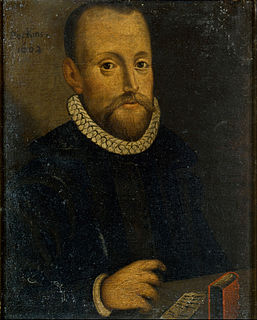
William Perkins (1558–1602) was an influential English cleric and Cambridge theologian, receiving both a B.A. and M.A. from the university in 1581 and 1584 respectively, and also one of the foremost leaders of the Puritan movement in the Church of England during the Elizabethan era. Although not entirely accepting of the Church of England's ecclesiastical practices, Perkins conformed to many of the policies and procedures imposed by the Elizabethan Settlement. He did remain, however, sympathetic to the non-conformist puritans and even faced disciplinary action for his support.

Gervase Babington (1549/1550–1610) was an English churchman, serving as the Bishop of Llandaff (1591–1594), Bishop of Exeter (1594–1597) and Bishop of Worcester in 1597–1610. He was a member of the Babington family and held influential offices at the same time as his cousin Anthony Babington was executed for treason against Elizabeth I as part of the Babington Plot.
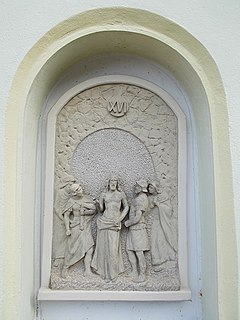
The Lord's Day in Christianity is generally Sunday, the principal day of communal worship. It is observed by most Christians as the weekly memorial of the resurrection of Jesus Christ, who is said in the canonical Gospels to have been witnessed alive from the dead early on the first day of the week. The phrase appears in Rev. 1:10.

The seventh-day Sabbath, observed from Friday evening to Saturday evening, is an important part of the beliefs and practices of seventh-day churches. These churches emphasize biblical references such as the ancient Hebrew practice of beginning a day at sundown, and the Genesis creation narrative wherein an "evening and morning" established a day, predating the giving of the Ten Commandments. They hold that the Old and New Testament show no variation in the doctrine of the Sabbath on the seventh day. Saturday, or the seventh day in the weekly cycle, is the only day in all of scripture designated using the term Sabbath. The seventh day of the week is recognized as Sabbath in many languages, calendars, and doctrines, including those of Catholic, Lutheran, and Orthodox churches.
Anthony Burges or Burgess was a Nonconformist English clergyman, a prolific preacher and writer.

The Sabbath is a weekly day of rest or time of worship given in the Bible as the seventh day. It is observed differently in Judaism and Christianity and informs a similar occasion in several other faiths. Observation and remembrance of Sabbath is one of the Ten Commandments considered to be the fourth in Judaism, Eastern Orthodoxy, and most Protestant traditions, and the third in Roman Catholic and Lutheran traditions.
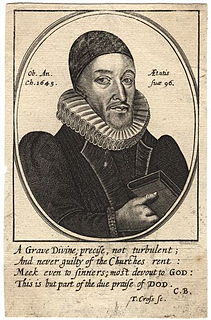
John Dod, known as "Decalogue Dod", was a non-conforming English clergyman, taking his nickname for his emphasis on the Ten Commandments. He is known for his widely circulated writings. Although he lost one means of livelihood because of Puritan beliefs, he had important support from sympathetic members of the Puritan gentry throughout a long career.
Edward Brerewood was an English scholar and antiquary. He was a mathematician and logician, and wrote an influential book on the origin of languages.
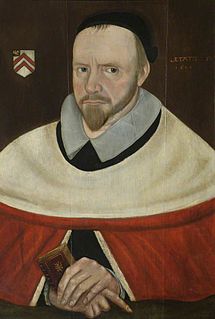
John Jegon was an English academic and Bishop of Norwich. He supported uniformity of Anglican doctrine and worship, and strong government. This led him into conflict with John Robinson, later pastor to the Mayflower emigrants. On the other hand, he made efforts to satisfy local Puritans by the appointment of preachers in his diocese. Nicholas Bownd dedicated to him a work on doctrine of Sabbath.
Robert Some (Soame) (1542–1609) was an English churchman and academic. Master of Peterhouse, Cambridge from 1589, Some played a prominent part in the ecclesiastical controversies of his time, taking a middle course, hostile alike to extreme Puritans and Anglicans.
George Walker (c.1581–1651) was an English clergyman, known for his strong Puritan views. He was imprisoned in 1638 by William Laud, Archbishop of Canterbury, an affair that was later raised against Laud at his trial. He became a member of the Westminster Assembly in 1643.
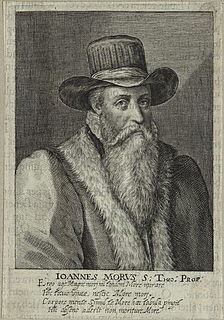
John More was an English clergyman, known as the 'Apostle of Norwich.' Tending to nonconformity, he was treated leniently by the church authorities.
Richard Byfield (1598?–1664) was an English clergyman, Sabbatarian controversialist, member of the Westminster Assembly, and ejected minister.
John Stockwood was an English clergyman, preacher, translator of Protestant texts and school-master.
William Burton was an English clergyman, known for his writings, an insider's view of the Puritan ascendancy at Norwich, and as an eyewitness to heresy executions.

Sabbatarianism advocates the observation of the Sabbath in Christianity, in keeping with the Ten Commandments.

Thomas Allen or Allyn was an East Anglian nonconformist minister and divine who preached during the 1640s in Charlestown, Massachusetts, but returned to England during the Commonwealth and was ejected after the Restoration. He was the author of various published works.
Richard Greenham (1535?–1594?) was an English clergyman of Puritan views, well known for his strong Puritan doctrine of the Sabbath. His many sermons and theological treatises had a significant influence on the Puritan movement in England.
Samuel Page (1574–1630) was an English clergyman and poet.
 Parker, Kenneth L. (1885–1900). "Bownd, Nicholas". Dictionary of National Biography . London: Smith, Elder & Co. 3084.
Parker, Kenneth L. (1885–1900). "Bownd, Nicholas". Dictionary of National Biography . London: Smith, Elder & Co. 3084.








